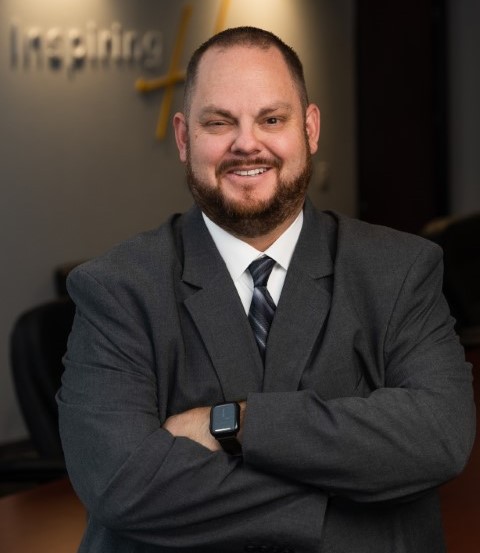

President & CEO
Justin Chase, President & CEO of Solari, brings an employee-centered leadership approach to Solari Crisis & Human Services. When Justin started his role in the organization, he inherited a 35% turnover rate. Within nine months under his leadership, the organization reduced it below 7%. This was due to a shift in leadership approach and a heavy focus on employee engagement and voice. To support employee engagement, he took a different philosophy made famous by Sir Richard Branson. The philosophy is that as a leader, you should “take care of your employees so they can, in turn, take care of your customers.” This about-face from traditional management was a game changer and really cultivated an employee-centric culture within the organization.
Justin is skilled at cultivating and maintaining collaborative relationships with community members and stakeholders. He had the ability to turn around, in a very short period of time, a negative perception among funders and stakeholders and prevented a bid process for Solari’s largest contract. The organization was able to retain the contract, which is still active today! This took a lot of sweat equity and humility to engage publicly with funders and stakeholders that we will be different. Justin didn’t ask for them to trust him simply. He just asked for a bit of time to show them that the organization would be different moving forward.
Today, under Justin’s leadership, Solari, Inc. serves as the largest non-profit crisis contact center in the United States, answering more than 30,000 crisis calls per month while providing the highest level of care with compassion and understanding. Solari’s highly trained and skilled staff answer the line in less than eight seconds with an abandonment rate below one percent. Solari’s sophisticated and customized technology platform provides unparalleled data analytics and reporting.
Leading & Motivating
Justin is committed to being a support system to other leaders and organizations within and around the crisis industry. He is an active participant in Vistage Worldwide, an international network of CEOs committed to supporting and enhancing each member’s organization and includes monthly group meetings and 1:1 executive coaching. Justin also sits on various boards including the International Council for Helplines, Lifeline International, National Suicide Prevention Lifeline Steering Committee, the Arizona Governor’s Taskforce on Behavioral Health, the Arizona Health Map Task Force, as well as currently leads a weekly gathering of crisis line leaders supporting the rollout of the national 988 Suicide and Crisis Lifeline.
Justin serves as a principal consultant under Solari’s consulting services supporting current Missouri crisis system evaluation and design efforts. He is always willing to offer advice or problem solve any leader’s situation, maintaining an open-door philosophy to anyone who might benefit. Following Simon Sinek’s approach to starting with ‘why’ when engaging employees in new business ideas is an excellent way to connect the new concept with the mission and strategic vision of the organization and not be afraid to roll up your sleeves and get your hands dirty occasionally. When big projects or tight timelines come along, it can motivate employees to get in there and help. Maybe it’s serving meals, moving furniture, setting up alternative work sites, or making coffee. There is never a task or job that is below Justin within the organization. He does not ask anyone to do a task he would not be willing to do himself. “Employees are the brand ambassadors of every organization. They have the most direct contact with customers and community members at large. Ignoring the wants and needs of your employees while expecting exceptional customer service will never work. Take care of your employees and they will take care of your customers, period,” elucidates Justin.
Building An Organization
Solari Crisis & Human Services is an award-winning, non-profit organization dedicated to helping individuals through a continuum of crisis and human services. They have been a consistent and committed crisis care services provider in Arizona since 2007. “We keep our mission of “Inspiring Hope” short and simple because we believe in making a difference in every way we can. Whether it’s by running our own programs, partnering with others on their programs, or providing consulting and technology solutions, we make services accessible to those who need them most,” explains Justin. The Solari team has extensive experience designing, building and running data-driven crisis and human services programs that help those in need wherever they are.
Solari Crisis & Human Services has developed a custom unified technology system, called CRNexus, to create seamless interfaces between all call center operations. CRNexus successfully integrates the HIPAA-compliant electronic health record with the sophisticated telephony system, allowing fast and efficient documentation with minimal screen navigation. This improves staff productivity and quality since the staff can focus more on a caller’s unique needs and solve problems. In addition to the improved staff user experience, CRNexus is able to generate real-time automated reports, dashboard feeds, and files needed for Medicaid reimbursement billing.
Thanks to the successful launch of CRNexus now in three states (Arizona, Utah and Oklahoma), the product has resulted in a reduction in the number of billing staff needed from six to three, an improvement in billing accuracy with a current error rate below 1% in Arizona, reduction in data entry errors and increased efficiency in all three states. Funders in all locations are very pleased with the automated reports that are generated daily and weekly, as well as the ability to drill down in real-time for ad hoc needs.
For Justin, the most significant achievement of the non-profit organization is the quick about-face of the employee experience early on, the significant reduction in turnover rate clearly measures that. “Within Solari we look forward to upcoming efforts to further enhance the quality and depth of our service offerings within each existing business area, with hopes to expand our consulting services as well as our call center operations into new locations,” says Justin. “We plan to roll out our new dispatch management system for mobile crisis dispatch and coordination before the end of 2022.”
Behavioral health expert
Justin has been hailed as a behavioral expert and recently behavioral health experts came together envisioning Arizona’s 988 crisis response system to provide individuals experiencing behavioral health emergencies with the same level and urgency of care as individuals experiencing medical emergencies.
Justin along with Rachel Rios-Richardson, Evaluation Associate at LeCroy & Milligan Associates, Inc, David Covington, CEO & President at RI International, and Wendy Farmer, Director of Account Management at Beacon Health Options, discussed this topic during a panel at the 2022 Arizona State of Reform Health Policy Conference in May.
Rios-Richardson said that, according to a survey distributed by her organization to people in the state with lived experience calling crisis lines or 911 for behavioral health emergencies, people in Arizona are very excited about 988 and prefer to call a 3-digit number, and so the state is preparing for a major shift in volume.
Justin said that although the volume of calls to 988 is expected to be high, he believes the state is well-positioned and ready for the new crisis response system to be rolled out.
“We think we’re gonna see more of the statewide calls shift over to 988, but the delta of what the total volume is going to be may not be as big of an impact on Arizona because the [crisis response] system and infrastructure is quite robust as it is.”
Starting Oct. 1st, a single statewide 800-number crisis line, operated solely by Solari, will go into effect, consolidating the 23 advertised crisis lines that currently operate in the state. 988 calls, starting July 1st, will be routed to both Solari and La Frontera Arizona. The statewide crisis line will work in tandem with the 988 line.
Justin emphasized the importance of the state system and the 988 system working together, stating that about 23,000 calls are captured per month in the central northern parts of the state on the existing state system, making the existing system the point where the majority of Arizonans are currently accessing crisis care. This constitutes 3,000 mobile crisis units being dispatched in a month.
However, Justin also highlighted that the call centers are stabilizing the majority of calls over the phone and are not needing to dispatch higher levels of care.
“The value of 988 is different. It’s not just a relay service, getting people to higher cost downstream services that aren’t necessary … It’s the assessment triage and potential therapeutic intervention taking place at the call center level. If [the call center] is not able to meet the needs, then it moves off to a higher level of care.”
Covington said it’s important for the 988 system to maintain the same level of care urgency for behavioral health emergencies as medical emergencies while simultaneously shifting response services away from law enforcement, emergency medical services (EMS), and hospital emergency departments.
“What we have today is a system where certainly many are involved with law enforcement on the front end,” he said. “But if you need intensive support, virtually everyone is going through the choke point of a hospital emergency department.
They’re spending, in most cases, days … if you’re an adolescent, it can be a week or more spent just detained in a small, sometimes windowless emergency department room, without treatment, without support, without engagement. 988 and mobile crisis services and directly accessible crisis facilities give us a way to let 911 and hospitals do what they do—respond to overt criminal activity, explicit threats to public safety, and obvious medical emergencies that are not psychiatric in nature.”
Justin also emphasized the importance of rapid response times on the 988 crisis line.
“We have to answer as fast and as good as 911 does if we’re going to maintain that performance expectation for individuals, because one bad experience can divert an individual to care,” he said. “With mobile teams, we’ve gotta get out on the scene fast enough, and with receiving facilities, to be able to have that open door for folks to walk in or a place for first responders to drop individuals off in a swift process.”

" Employees are the brand ambassadors of every organization. They have the most direct contact with customers and community members at large. "
Justin N. Chase
Solari




© THE CEO PUBLICATION 2021 | All rights reserved. Terms and condition | Privacy and Policy